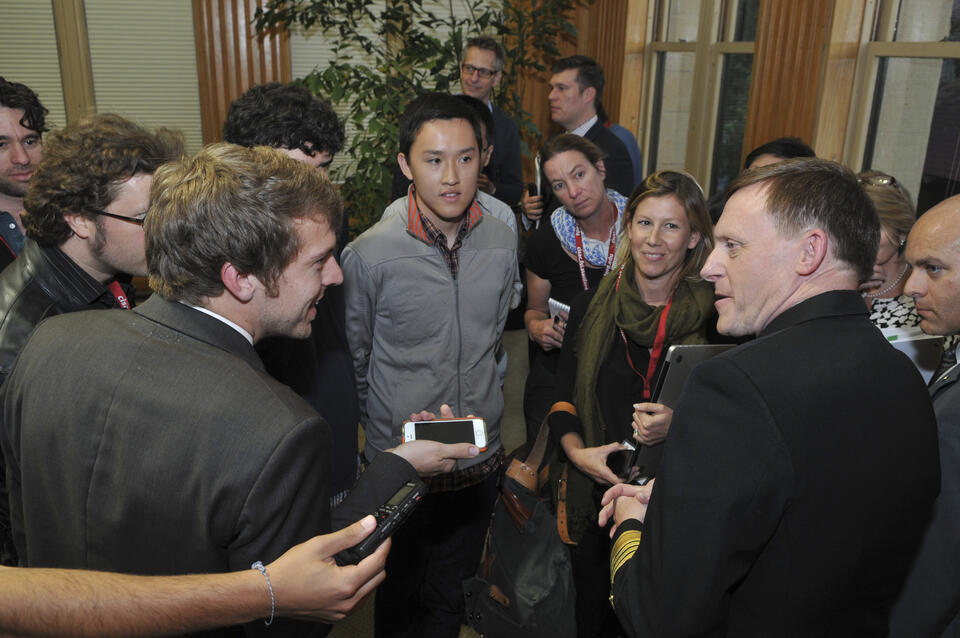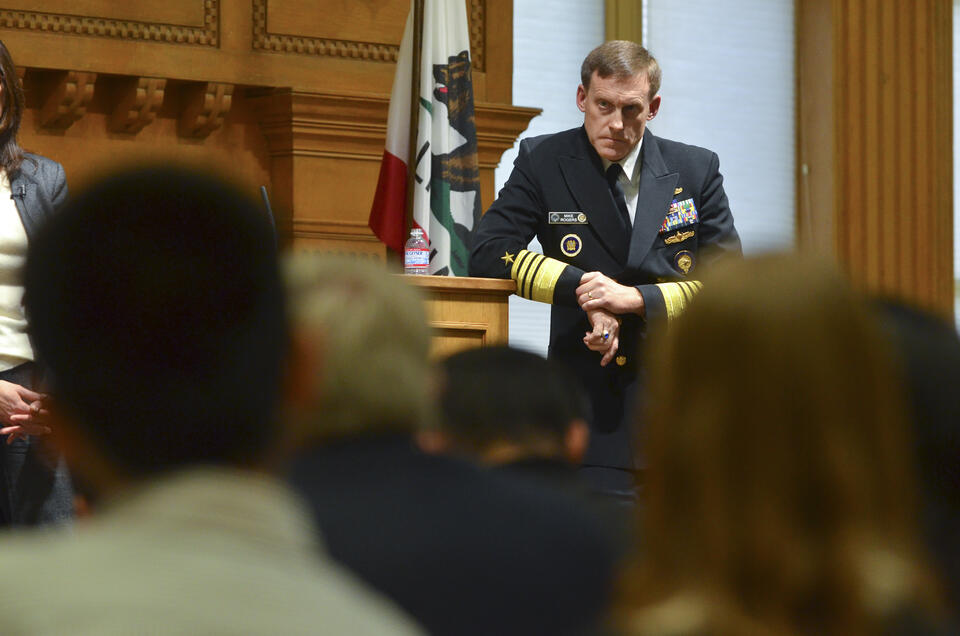National Security Agency Director Admiral Michael Rogers told a Stanford University audience during a rare visit to Silicon Valley that his greatest concern today is that the nation is not yet prepared to defend against a major cyber terrorist attack.
He said the growing rift among the signals intelligence agency, tech companies and civil liberties organizations over the shifting boundaries of privacy rights and secret surveillance is weakening the nation’s resolve.
“We have yet to be able to come to a broad policy and legal consensus about how we deal with some of the legal issues in cyber now,” said Rogers, who took over the leadership of the embattled intelligence agency in April.
The admiral, wearing military dress, spoke to some 300 Stanford students, faculty and tech executives in an event sponsored by the Center for International Security and Cooperation (CISAC) and the Hoover Institution.
Watch the Rogers talk in this video:
His wide-ranging talk on Monday – in which he appealed to Stanford students to consider a career at the intelligence agency – came on the eve of a hearing by a federal appeals court investigating whether the NSA’s surveillance program violates the U.S. Constitution’s ban on unreasonable searches. The Justice Department argues that collecting phone data is of overriding importance to national security.
The NSA, whose mission is to prevent foreign adversaries from getting their hands on classified national security data, has come under fire since NSA contractor Edward Snowden disclosed last year the extent of the government’s electronic surveillance programs. The former CIA system administrator leaked documents to journalists that revealed global surveillance programs with the cooperation of some telecommunications companies and European governments.
One of those journalists was Barton Gellman of the Washington Post, who received dozens of top-secret documents from Snowden when he traveled to Moscow to meet him. Gellman, who shared the 2014 Pulitzer Prize for Public Service for his reporting on the Snowden materials and the NSA, will address a Stanford audience on Nov. 17th as part of the university’s “Security Conundrum” lecture series.
Rogers indicated that until a consensus is reached on government surveillance, the United Sates is vulnerable to attack.
“Is it going to take a crisis to wake us up and say, `Man, how did we get here?’” he asked. “I don’t want to be at the end of another 9/11 commission asking how we got here.”
Rogers said the government is backing a bill known as the Cybersecurity Information Sharing Act, which would allow tech firms and the U.S. government to share cyber threats captured through Internet data. The bill was introduced to the Senate in July but has not yet been voted on by the full Senate. Opponents of the bill say it would only give the NSA enhanced spying powers.
Rogers called the proposed legislation critical. “Without it, cyber becomes a huge cost for us as a nation.”
Rogers said he knows Americans’ trust in their government is dismal.
“We have a fairly limited faith in Washington and there is incredible frustration over the mechanisms of our government, whether it be the legal framework, the courts, the Congress,” he said. “It’s hard to achieve a political consensus when we’re losing faith in many of the mechanisms.”
And still, he called on Stanford students – namely the engineering and computer science majors who were in the audience – to come work for him. While acknowledging that the NSA could not match the salaries of Google, Yahoo and Facebook, he said they could do something worthwhile for their nation.
“If we’re going to make this about money – we don’t stand a chance,” Rogers said.
But, he added, “We’ll give you an opportunity to dedicate yourself to something that is bigger than you: service to the nation.”
Rogers said young recruits would be given great responsibility at an early stage in their careers. And, they’d get to play real-world spy games. “We’re going to give you the opportunity to do stuff you can’t legally do anywhere else,” he said.
Not all students in the audience were ready to sign up.

Thu-an Pham, a sophomore who has yet to declare her major, said after listening to the talk that she’s concerned that NSA surveillance is curbing innovation.
"I'm worried about the impact of surveillance on the culture of innovation,” she said. “Glenn Greenwald gave a recent TED Talk on the importance of privacy. He showed that people alter their behavior to conform to norms and expectations if they suspect they are under surveillance, which stifles individuality and free-thinking.”
Pham also said she’s concerned about the possibility of American officials “outsourcing illegal tasks to other governments.”
The National Journal reported last week that the NSA has given broad access to British intelligence to Americans’ telephone calls and Internet traffic, leading civil liberties activists to accuse the agency of trying to circumvent the Fourth Amendment.
Amy Zegart, CISAC’s co-director and a senior fellow at the Hoover Institution, moderated the one-hour talk and Q&A in Encina Hall.
Zegart, an intelligence expert, noted tech firms are tightening encryption standards to prevent government spying on their customers.
Google and Yahoo are working on tools to encrypt their email systems and Apple and Google just announced its mobile operating systems would eventually be encrypted by default. Government officials have warned that the tech firms could be aiding criminals and terrorists with these tougher encryption standards; FBI Director James Comey suggested Silicon Valley build encryption with a backdoor for the U.S. government to spy on potential terrorists.
“Industry is very concerned about evidence of the NSA undermining encryption standards. If the NSA were to find a way through encryption standards, how do you weigh the right thing to do?” Zegart asked.
“Let there be no doubt that a fundamentally strong Internet is in the best interest of the nation,” Rogers replied. “When you find vulnerabilities, we are going to share them; the default mechanism is that we’re going to share the vulnerabilities.”
CISAC Affiliate Jennifer Granick, director of civil liberties at the Stanford Law School's Center for Internet and Society, asked Rogers to answer to disclosures by Snowden that the NSA secretly broke into communications on Yahoo and Google servers overseas.
“We do not use any foreign partners as a vehicle to overcome and bypass U.S. law,” Rogers replied. “When we partner with our Five Eyes teammates, we remind them that we have specific requirements that we must meet.”
The Five Eyes refers to an intelligence alliance of the United States, Canada, Great Britain, Australia and New Zealand to share signals intelligence.
Rogers conceded the Department of Defense no longer drives technical innovation, so the government will have to increasingly rely on the brainpower of Silicon Valley. He pledged to visit every six months and build partnerships with tech firms.
But he emphasized that national security could not be left to the technologists.
“It is unrealistic to expect the private sector to withstand the actions of nation-states,” Rogers said. “I think it is also unrealistic to expect the government to deal with this all by itself. We have got to create those partnerships that enable us to actually share information and insight in a real-time basis.”
Former CISAC Honors Student Joshua Alvarez contributed to this story.



 President Obama addresses the Sony hacking, saying the United States will "respond proportionally," at his year-end press briefing on Dec. 19.
President Obama addresses the Sony hacking, saying the United States will "respond proportionally," at his year-end press briefing on Dec. 19.

 President Ma Ying-jeou attends a news conference in Taipei January 12, 2012.
President Ma Ying-jeou attends a news conference in Taipei January 12, 2012.





